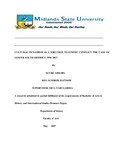Please use this identifier to cite or link to this item:
https://cris.library.msu.ac.zw//handle/11408/2643Full metadata record
| DC Field | Value | Language |
|---|---|---|
| dc.contributor.author | Ncube, Abigirl | - |
| dc.date.accessioned | 2017-07-12T13:33:28Z | - |
| dc.date.available | 2017-07-12T13:33:28Z | - |
| dc.date.issued | 2017 | - |
| dc.identifier.uri | http://hdl.handle.net/11408/2643 | - |
| dc.description.abstract | This research sought to highlight how cultural dynamism solved conflicts between the four ethnic groups of Gokwe south. The research argues that clinging to individual cultures and seeing the next person’s culture as inferior was the major cause for conflicts. Therefore accepting one another and bearing in mind that culture is dynamic marked the end of conflicts. As a result people are now living together peacefully and one cannot tell the difference between these groups today. This research therefore proves that while it is true that these people once had hard time staying together, they ended up accepting each other in their differences. Using field work, it was proved that these people are now living together well and there are no more differences. They had done away with their different backgrounds and are now focusing on what is on ground. | en_US |
| dc.language.iso | en | en_US |
| dc.publisher | Midlands State University | en_US |
| dc.subject | Cultural dynamism | en_US |
| dc.subject | Conflicts | en_US |
| dc.title | Cultural dynamism as a solution to ethnic conflict the case of Gokwe south district 1950- 2017 | en_US |
| item.grantfulltext | open | - |
| item.fulltext | With Fulltext | - |
| item.languageiso639-1 | en | - |
| Appears in Collections: | Bachelor Of Arts In History And International Studies Honours Degree | |
Page view(s)
170
checked on Feb 4, 2026
Download(s)
160
checked on Feb 4, 2026
Google ScholarTM
Check
Items in MSUIR are protected by copyright, with all rights reserved, unless otherwise indicated.




